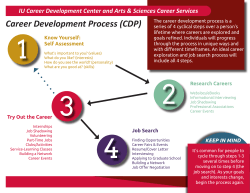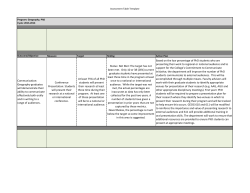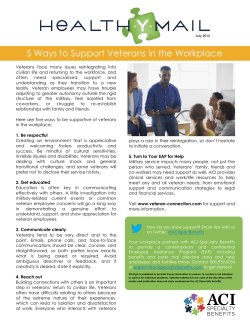
Addressing the Psychological Health of Warriors and Their Families
(continued) Addressing the Psychological Health of Warriors and Their Families A Center for Deployment Psychology Civilian Training Program March 16-20, 2015 Phoenix, Arizona Allen Readiness Center Arizona National Guard Papago Park Military Reservation 5636 E. McDowell Road Phoenix, AZ 85008 The Center for Deployment Psychology (CDP) is a tri-service psychology training consortium headquartered at the Uniformed Services University of the Health Sciences (USU) in Bethesda, Maryland. As the Nation’s only federal health sciences university, USU is committed to excellence in military medicine and public health during peace and war. TRAINING GOALS: Describe military terminology and operations and examine military culture and values as they relate to military behavioral health Identify stressors commonly confronted by Service members and their families before, during, and after deployment Understand the scope of depression and suicide as military health problems Review empirically-supported and promising treatments used to treat depression and suicidal ideation and behavior, and their use with military veterans Enhance knowledge of “gold standard” measures and tools for assessing PTSD in service members Identify military sexual assault (MSA) in clinical settings Registration Fee: $95 Identify and discuss ethical challenges facing clinicians working with service members and veterans Become familiar with the epidemiological evidence describing alcohol and drug use disorders in the U.S. civilian and military populations, including active duty service members and veterans Identify the symptoms and rates of blastrelated traumatic brain injury (TBI) and outline treatment resources Describe the prevalence of sleep problems experienced by military personnel, and examine different components of CognitiveBehavioral Therapy for Insomnia (CBT-I) Summarize and apply the skills of Cognitive Processing Therapy (CPT) to treat combatrelated PTSD Seating is Limited. Register Early. FOR ADDITIONAL INFORMATION AND TO REGISTER: http://www.deploymentpsych.org/training/civilian/phoenix-az This fee is charged regardless of the number of sessions attended FOR QUESTIONS CONTACT: Ms. Hakimah Campbell oneweektraining@deploymentpsych.org “Overall I have to say the training was one of the best in my career. The Center for Deployment Psychology faculty really do an excellent job!” – Salt Lake City, UT “Excellent, highly applicable training providing the tools necessary to conduct cutting-edge treatment for this most deserving population. Thank you.” – Madison, WI Addressing the Psychological Health of Warriors and Their Families March 16-20, 2015 – Phoenix, AZ GS General Session Track 1 PTSD Track Track 2 Health Psychology Track MONDAY, March 16, 2015 CDP DAY HOST: Michael Jones, PhD 7:30 am – 8:00 am Check-in and Morning Coffee & Tea 8:00 am – 8:15 am Welcome, Introduction, and Orientation 8:15 am - 10:00 am Session 1 (GS) – Military Culture and Terminology: Enhancing Clinical Competence Michael Jones, PhD CDP, Deployment Behavioral Health Psychologist Break 10:00 am – 10:15 am 10:15 am – 12:00 pm Session 2 (GS) – The Deployment Cycle and Its Impact on Service Members and Their Families Michael Jones, PhD Lunch Break (on your own) 12:00 pm – 1:30 pm 1:30 pm – 2:30 pm Session 2 (continued) Break 2:30 pm – 2:45 pm 2:45 pm – 4:45 pm Session 3 (GS) – The Unique Challenges of Military Families Kelly Chrestman, PhD CDP, Lead, Consultation Services TUESDAY, March 17, 2015 CDP DAY HOST: Kelly Chrestman, PhD Check-in and Morning Coffee & Tea 7:30 am – 8:00 am 8:00 am - 10:00 am Session 4 (GS) – Overview of Traumatic Brain Injury (TBI) in the Military Kelly Chrestman, PhD Break 10:00 am – 10:15 am 10:15 am – 12:15 pm Session 5 (GS) – Alcohol and Drug Use in Military Veterans Elizabeth Parins, PsyD CDP, Project Developer and Trainer, Military and Civilian Programs Lunch Break (on your own) 12:15 pm – 1:45 pm 1:45 pm – 3:15 pm Session 6 (GS) – Assessment and Treatment of Depression and Suicidal Behavior Associated with Military Service: An Overview Kelly Chrestman, PhD Break 3:15 pm – 3:30 pm 3:30 pm – 4:45 pm Session 6 (continued) WEDNESDAY, March 18, 2015 CDP DAY HOST: Elizabeth Parins, PsyD Check-in and Morning Coffee & Tea 7:30 am – 8:00 am 8:00 am - 10:00 am Session 7 (GS) – Sexual Assault in the United States Military Kelly Chrestman, PhD Break 10:00 am – 10:15 am 10:15 am – 11:45 am Session 8 (GS) – Ethical Considerations for Working with Military Members and Veterans Elizabeth Parins, PsyD Lunch Break (on your own) 11:45 am – 1:00 pm 1:00 pm – 2:30 pm Session 8 (continued) Break 2:30 pm – 2:45 pm 2:45 pm – 4:45 pm Session 9 (Track 1) – Sleep Disorders: An Overview of Sleep Disorders Common in Military Members Elizabeth Parins, PsyD Session 9 (Track 2) – Assessment and Treatment of PTSD Carin Lefkowitz, PsyD CDP, Cognitive Behavioral Therapy Trainer 4:45 pm – 5:00 pm Case Study Wrap-Up Case Study Wrap-Up THURSDAY, March 19, 2015 CDP DAY HOST: William Brim, PsyD Check-in and Morning Coffee & Tea 7:30 am – 8:00 am 8:00 am - 11:45 am Session 10 (Track 1) – Evidence-Based Treatment for PTSD: Cognitive Processing Therapy (CPT) Carin Lefkowitz, PsyD Lunch Break (on your own) 11:45 am – 1:00 pm 1:00 pm – 4:45 pm Session 10 (Track 2) – Assessment and Treatment of Sleep Disturbances Associated with Deployment William Brim, PsyD CDP, Deputy Director Session 10 (continued) Session 10 (continued) FRIDAY, March 20, 2015 CDP DAY HOST: William Brim, PsyD Check-in and Morning Coffee & Tea 7:30 am – 8:00 am 8:00 am - 11:45 am Session 10 (continued) Lunch Break (on your own) 11:45 am – 1:00 pm 1:00 pm – 4:45 pm Session 10 (continued) Session 10 (continued) Speakers and schedule subject to change Session 10 (continued) ELIGIBLE PARTICIPANTS: This course is designed for civilian licensed mental health providers including psychologists, social workers, psychiatrists, and marriage & family therapists who are actively treating military personnel, veterans, and their families. Active duty mental health providers interested in attending this course should contact the CDP to inquire about trainings designed specifically for them. While we recognize that many individuals may be interested in attending this course, the material is not designed for, and may not be appropriate for, non-professionals and those who are not working with this population. Participants are encouraged to attend the entire one-week program in order to receive comprehensive training for working with the military/veteran population. However, participants can select to attend specific sessions within their chosen track for which separate CE credits will be provided. CONTINUING EDUCATION (CE) INFORMATION: CE accreditation is provided by PESI, Inc. for this one-week training. Please carefully read the information provided by PESI, Inc. (found under the Continuing Education Information tab on the registration website) to learn more about CE credits and the disciplines covered. After reading this information, if you still have specific questions about CE credits, please contact Dawn Messing directly at dmessing@pesi.com.
© Copyright 2025











